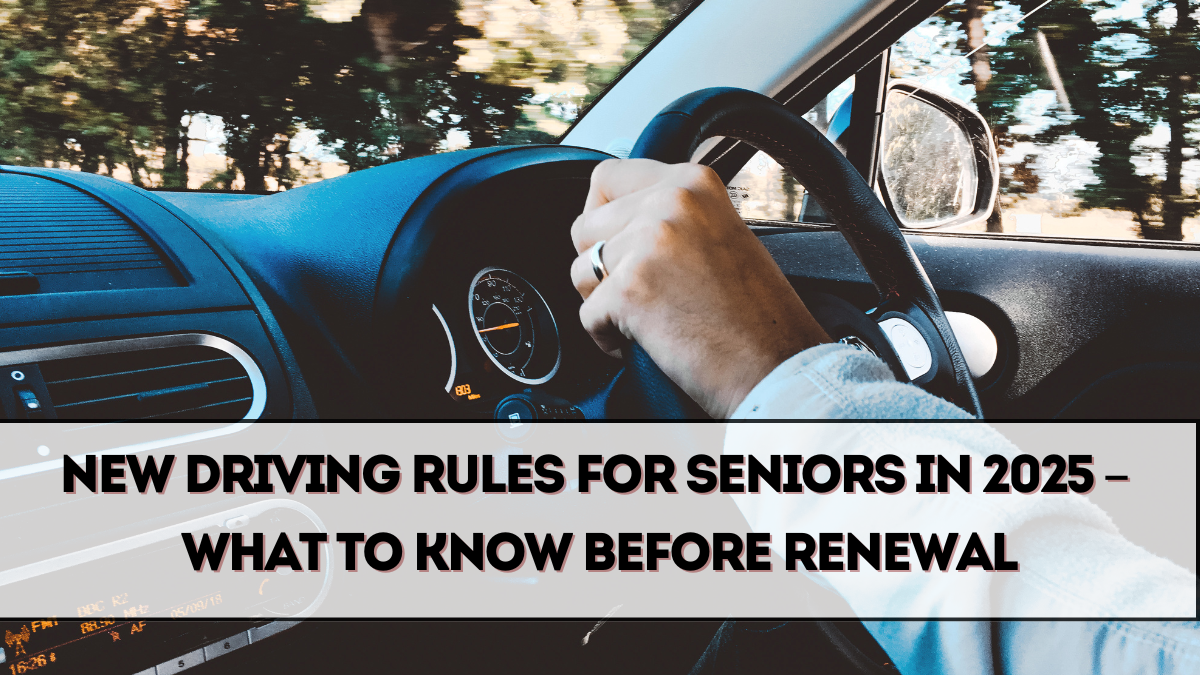Driving is more than just a mode of transport—it represents independence and freedom, especially for senior citizens. However, as populations age and road safety becomes a bigger concern, governments in the UK, New Zealand (NZ), and Australia (AU) have introduced stricter regulations under the New Driving Rules for Seniors 2025. These updates primarily focus on license renewal processes, mandatory medical tests, and driving competency evaluations to ensure safety for both seniors and other road users.

Why Were the Rules Changed in 2025?
Road safety data from recent years revealed that seniors over the age of 70 are more prone to accidents due to age-related issues like slower reaction time, weaker eyesight, and reduced mobility. Governments decided to introduce new regulations to:
-
Ensure only medically fit seniors continue driving.
-
Reduce accident risks in busy urban and highway traffic.
-
Standardize age-related renewal rules across regions.
-
Encourage the use of alternative mobility options where needed.
The updates have been welcomed by road safety advocates but sparked debates among senior communities concerned about losing independence.
UK – Senior Driving Licence Updates
In the UK, new rules in 2025 target drivers aged 70 and above.
-
License Renewal Frequency: Seniors must now renew every 3 years instead of 10.
-
Medical Certification: Mandatory medical forms signed by a GP or certified optometrist.
-
Driving Assessments: For high-risk individuals, on-road assessments may be required.
-
Vision Tests: Seniors must pass a standard eyesight test at every renewal.
These measures ensure that elderly drivers remain safe while allowing those who are medically fit to continue driving.
New Zealand – Stricter Senior Road Safety Rules
New Zealand has also updated its rules for older drivers:
-
Age Limit: Drivers over 75 years must undergo compulsory medical checks.
-
License Validity: Reduced to 2 years for drivers above 80.
-
Practical Driving Test: Required if a doctor recommends further evaluation.
-
Alternative Options: Seniors not meeting standards are encouraged to use public transport or community ride programs.
The NZ government emphasizes balancing safety with mobility for elderly citizens, making public transport more senior-friendly.
Australia – State-Specific Senior Driving Regulations
Australia follows a state-based system, so rules differ across regions. In 2025, updates include:
-
NSW (New South Wales): Mandatory annual medical exams after age 75; driving tests required after 85 unless restricted to local areas.
-
VIC (Victoria): New digital health records integrated into the licensing system for faster medical clearance.
-
QLD (Queensland): Introduction of online cognitive testing alongside medical assessments.
-
WA (Western Australia): Annual health check-ups mandatory for drivers above 80.
Overall, Australia is focusing on personalized assessments rather than blanket restrictions.
Key Focus – Medical Tests and License Renewal
Across all three countries, the New Driving Rules for Seniors 2025 highlight two main requirements:
-
Medical Tests
-
Covers eyesight, reflexes, and cognitive abilities.
-
Ensures seniors are physically capable of handling road demands.
-
-
License Renewal Frequency
-
Shorter validity periods encourage frequent health monitoring.
-
Renewal now linked to medical approval in most regions.
-
Impact on Seniors and Families
These new rules bring both advantages and challenges:
-
Advantages:
-
Safer roads for all drivers.
-
Early detection of health issues.
-
Greater confidence for families that their elderly relatives are safe on the road.
-
-
Challenges:
-
Seniors may feel loss of independence.
-
Rural areas with limited transport may face hardships.
-
Increased financial and administrative burden for frequent renewals.
-
Families are encouraged to support seniors in adjusting to the new rules, including exploring alternative mobility options when needed.
Global Trend Toward Stricter Senior Driving Rules
South Africa, Canada, and the US are also considering similar updates. Globally, the focus is on:
-
Using digital health tracking to monitor senior drivers.
-
Introducing conditional licenses (e.g., daylight-only driving).
-
Expanding public mobility services for seniors who give up driving.
This trend shows a shift toward prioritizing road safety without entirely removing driving privileges.
Comparison Table – Senior Driving Rules 2025
| Country | Renewal Age & Frequency | Medical Tests | Driving Test | Notes |
|---|---|---|---|---|
| UK | 70+, every 3 years | Mandatory GP & eye test | Case-by-case | New stricter checks |
| NZ | 75+, every 2–5 years | Compulsory | If required | Shorter validity after 80 |
| Australia | 75+ varies by state | Mandatory health checks | Yes (state-based) | Annual checks after 80 |
This table shows how rules vary but share the same focus: safety, medical checks, and renewal limits.
FAQs
What are the new senior driving rules in 2025?
Seniors must renew licenses more frequently, undergo mandatory medical tests, and in some cases take practical driving exams.
At what age do new rules apply in the UK?
From age 70, seniors must renew every 3 years with a medical certification and vision test.
How do the rules differ in Australia?
Each state has unique requirements. For example, NSW requires annual medical checks after 75 and driving tests after 85.
Are seniors losing their driving rights in 2025?
No, seniors can still drive if medically fit. The rules only ensure health and driving ability are monitored regularly.
Click here to know more.
